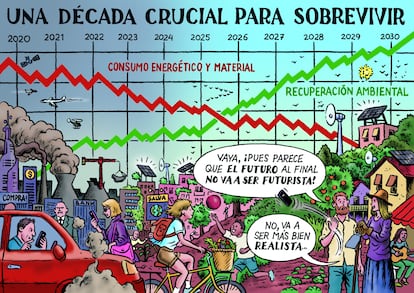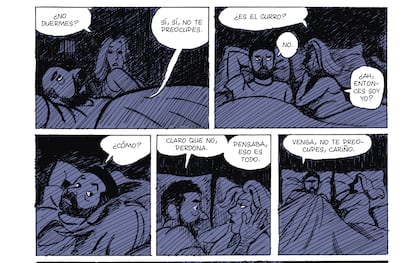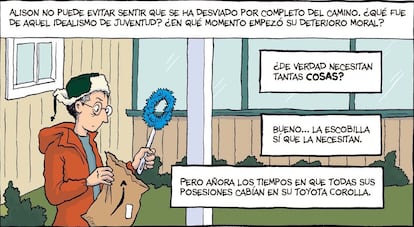All human beings laugh, cry, eat, sleep and love. Although most of the day is spent on another universal activity – work. Therefore, complaints at work are widespread throughout the world. Too many hours, stress, demands, sacrifices and various other things. Since its triumph, neoliberal capitalism has reiterated that there is no alternative. Lately, however, a simple option has emerged to question this. Or to understand the rules and dark sides of the game we all play. Just read one of the many comics about economics, exploitation, and other workplace injustices being published right now. It turns out that another world is possible, at least in the comics.
“We must understand economics ourselves, otherwise we will be at the mercy of some charlatan,” warns writer Michael Goodwin. He himself made his contribution: first, he delved into decades of treatises and thinkers; then, inside Ecomix (2012), he summarized in comics – with illustrations by Dan E. Burr – what he had collected: theories, practices and pitfalls from the last two centuries of development. There we discover that even Adam Smith, who went down in history as a champion of the free market, denounced the “rapacity” of the tycoons and called for caution regarding their legislative proposals. Or we reflect on a society that is democratic in its structures but “dictatorial” in many businesses.
“Every public issue or decision is economic. In the United States, the rich have essentially bought the institutions. If we had structured the economy differently, they couldn’t have done it. It was our choice. Or it was never presented to us in those terms,” observes Goodwin.
Ecomix it really does. And eliminate the excuse of excessive complexity: now understanding – or perhaps indignation – is within everyone’s reach. Like the recent graphic novel adaptation of Capital and ideology (2024): The original 1,248-page volume can be daunting even for admirers of its author, Thomas Piketty. But Claire Alet and Benjamin Adan’s graphic novel condensed it into 176 pages. The new social justice guru’s ideas are presented in a simplified, though no less insightful, form. And certainly, more accessible.
Sales were so strong that another of Piketty’s books, A brief history of equality (2021), has just been adapted for the same audience, by Sébastien Vassant and Stephen Desberg. This, incidentally, offers the most paradoxical example of capitalist power: even a criticism of the model can become a profit-maximizing tendency.
The truth is that there are cheap comics of all types, tones, authors, origins, eras and styles. Welcome to the world (OR, Welcome to the world)by the Spanish Miguel Brieva opts for a colorful and explicit satire, where a little girl asks her mother: “Hey, mom, do poor people really exist?” From the pool and the privileges they swim in, it certainly doesn’t seem that way.
Whistle (2022), by Louka Butzbach, instead chooses white, red and a subtle metaphor: an enormous potato that threatens to crush a city.
And Darryl Cunningham takes yet another path: previously inside Billionaires (2019)and now inside Elon Musk: American oligarch (2025), in which he highlights that climbing to the top often involves sacrificing scruples, legality and workers’ rights along the way.
A conclusion shared by How the rich are destroying the Earth (2008), by Hervé Kempf and Juan Mendez.

Alison Bechdel offers fewer answers, but many questions, in her book Spent (2025), which faces another difficulty: capitalism is so all-consuming that even the most principled end up making concessions.
Philippe Squarzoni, however, tests our consciences: readers of The dark fingerprint (OR, The dark fingerprint) will not forget the environmental cost of using smartphones or other technologies. “Ice cover over the Arctic in summer has decreased by more than 40% since 1979,” the graphic essay reports. Each page invites critical thinking, not just self-reflection: “In France, 63 billionaires cause more pollution than half the population.”
Nor will orders be placed so randomly after you finish The wonderful world of Amazon (OR, The wonderful world of Amazon). Clearly, getting off the treadmill seems difficult. At the same time, ignoring the consequences of letting him run, after reading these comics, becomes impossible.
Even more so when they prove fatal. Kanikosenby the Japanese artist Go Fujio (2023), adapts a story of double death into manga: the communist writer Takiji Kobaiashi denounced forced labor on board fishing boats in his country in his 1929 novel of the same name, but it cost him his life, due to police torture in 1933.1
AND When work kills (OR, When work kills) needs no further explanation beyond the title and the knowledge that its protagonist’s tragedy is based on true events. “This comic was born from a journalistic investigation into the wave of suicides in companies like Renault and France Telecom. After that, for a certain period, there was a certain awareness. The problem was seen, analysed, named. But only the details were changed, while the issue is within the system. Fundamentally, nothing has changed”, complains the journalist Hubert Prolongeau, co-author together with Arnaud Delalande and Grégory Mardon.

For Goodwin, the current situation is even worse than the one depicted in the finale Ecomix. “We are clearly entering a dystopian era. But it’s worth remembering that this is more of a failed utopia. Specifically, the one sold to us by free-market economists, which worked in their equations, but not in the real world, and is now collapsing,” the writer emphasizes.
That’s why I created his graphic novel. And he celebrates all the different reactions he has received from the public: those who simply finished his comic and are now more informed; those who kept reading more and more; and even today’s “professional economists”, who got their start thanks to the content of its pages. “Many of us are concerned about these issues, but we don’t know where to start. And we are often very busy. That’s why a comic can be ideal,” he adds. Although in summary it took a lot of work: in hindsight, he realized that he wasn’t producing more than one page a day. He would write 20, cut them in half, and then cut more and more. Even then it wasn’t enough anyway: sometimes he threw away what was left and started all over again.
“The advantage is that you reach more people and it can be simpler. The problem is that it becomes too simple and fails to convey all the complexity. Or, if it tries, it may become difficult and lose its advantages,” notes Prolongeau.
So, inside When work killsoriginal research focuses on a single individual. His name is Carlos, but he could be anyone who has seen how quickly hope and ambition can lead to depression and exploitation. Likewise, the graphic novel version of Capital and ideology follows a family through the decades, allowing the reader to see what descendants sometimes prefer to forget: fortunes and inequalities built on slavery, lobbies, colonialism and strategies as illegal as they are immoral.

In response, the comics offer some suggestions. Universal basic income is mentioned in both Ecomix AND Capital and ideology. The anthology Ecotopias compiles several feasible changes, describing a greener planet and other improvements they would bring. And Prolongeau urges us to protect the mental health of employees: “The paradox of suicide in the workplace is that it affects the most dedicated people. If you don’t care about your work, you don’t feel that recognition is at stake.”
“There are many options. We don’t even have to imagine them; we just have to look around. Social democracy works much better than unregulated capitalism by virtually any metric,” Goodwin points out. There is one recommendation that, in a certain sense, sums them all up: slow down, brake… even stop. Even just for a little while, to read a comic.
Goodwin adds: “It has a low barrier to entry and can get more people involved in these discussions. And not just as readers. It only takes one person to write a comic. Anyone can start today.” They just need to find the time, because there is so much to do every day. Laugh, cry, eat, sleep and love. And I work.
Sign up to our weekly newsletter to get more English-language news coverage from EL PAÍS USA Edition



